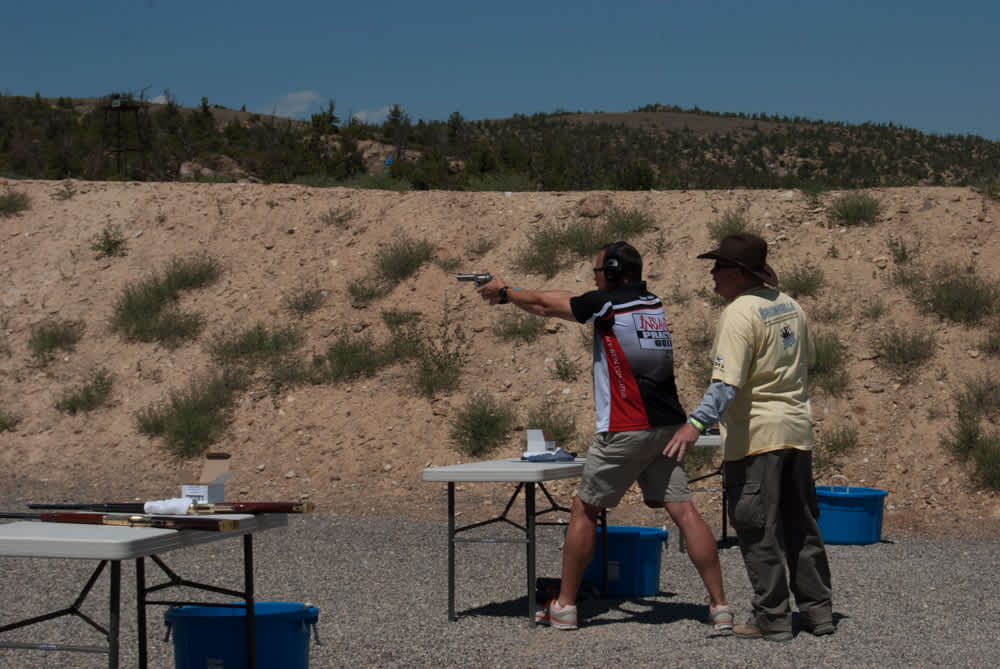Shooting Myths: Competitive Shooting Will Get You Killed on the Street
Tom McHale 04.22.14

Why is it that Internet opinions are so binary? Black or white, right or wrong, my way or the highway—it’s kind of like politics in the real world.
- “.45 is the only caliber! Because you only need to shoot once!”
- “9x19mm is fantastic—if you want to shoot balloons.”
- “Competitive shooting tactics will get you killed on the street!”
As with anything in life, there is rarely all right or all wrong. I tend to think in terms of better, better still, and even more better. Or on the flip side, I like to consider worse, way worse, and worse than Piers Morgan’s ratings.
Listening to Internet arguments about the merits of competitive shooting, one might think that if you practice competition skills, you’ll instantly burst into flames and self-immolate should you find yourself in a self-defense situation.
A few weeks ago, I was watching an episode of Shooting USA. That particular episode included coverage of the IDPA Indoor Championships. If you don’t know, IDPA stands for International Defensive Pistol Association. In their words,
IDPA is the use of practical equipment including full charge service ammunition to solve simulated “real world” self-defense scenarios using practical handguns and holsters that are suitable for self-defense use. The main goal is to test the skill and ability of an individual.
It’s a competition structured to partially mimic potential real-life defensive encounters. In the interest of making competitions fun and stimulating, the “real-life” part tends to get a little stretched now and then.
For example, at the IDPA Indoor Championships, one stage in particular appeared immensely fun, but just a tad outside the bounds of reality. It was an example of duck hunting gone horribly wrong. The shooter is placed in a duck blind, when suddenly a band of terrorists (or maybe hunting thugs intent on duck-jacking) makes their way across the front of your blind in a tactical rowboat. You have a short window of opportunity to deal with them, as the entrance and exit of the “battle boat” are obscured with weeds or some form of aquatic plant life. Oh, and there’s a hostage in the boat-jacking scenario that you can’t shoot. No word if that’s supposed to represent Uncle Si from Duck Dynasty.
Your mission, and you will accept it as you’re competing in the IDPA Indoor National Championships, is to take out the duck commandos as quickly as you can, without shooting the hostage, and before the boatload of doom escapes into the weeds.
Lest you think this sounds easy, the commandos planned in advance and had sniper overwatch. When you start perforating the rowboat, the accomplices pop up all over the place from their hides, and you have to take them out, too. You have to reload at least once in the process of filling the room with smoke and that delicious powder smell.
Is that scenario a perfect example of having more fun than should be legal? Heck yeah! Count me in! But the odds of you getting attacked by waterfowl terrorists in your lifetime are probably lower than me having a rich diplomat uncle in Nairobi that actually does need help transferring millions to the United States.
From a “tactical” perspective, that type of scenario is not really going to help you much in real life. But being happy and optimistic, I like to look at what value can be gained from that type of recreational activity.
It boils down to the opportunity to practice basic skills under just a little bit of stress. Of course, the stress of competition is nothing like fighting for your life. But having a clock running in your ear, a crowd of your peers watching, and video cameras just waiting to upload your humiliation to YouTube does create some anxiety. You’d be surprised at how just a small dose of nerves can throw off your normally-smooth reloads and malfunction clearances.
Let’s get back to that concept of better, better still, and even more better, and apply that to core skill development.
Before any of us start thinking about fancy tactics and how to deal with multiple-attacker scenarios, we better be confident in the most basic skills:
- Drawing quickly from concealment when a threat is presented.
- Maintaining trigger finger discipline.
- Thinking about what not to shoot at.
- Front-sight focus for first-shot hits.
- Quickly transitioning from one target to another.
- Maintaining awareness of what else is going on around you.
- What to do when you hear a “click” instead of a “bang.”
- Taking advantage of cover.
These are some of the skills that might help save your life one day. While hitting high-speed rowboat occupant targets may not, instinctively knowing what to do when you hear the dreaded “click” just might.
Scenarios like the duck commando encounter present a great and fun opportunity to work on some basic gun handling and shooting skills. Why not take the opportunity to get better at them, and have a great time in the process?
Acknowledge from the start that your goal is to have fun, and take away from them good, raw skill practice. When you master that stuff, go find a good tactical training facility to work on the advanced topics.
Tom McHale is the author of the Insanely Practical Guides book series that guides new and experienced shooters alike in a fun, approachable, and practical way. His books are available in print and eBook format on Amazon.

